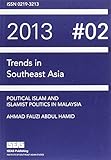Political Islam and Islamist Politics in Malaysia / Ahmad Fauzi Abdul Hamid.
Material type: TextPublisher: Singapore : ISEAS Publishing, [2013]Copyright date: ©2013Description: 1 online resource (27 p.)Content type:
TextPublisher: Singapore : ISEAS Publishing, [2013]Copyright date: ©2013Description: 1 online resource (27 p.)Content type: - 9789814519243
- 9789814519250
- online - DeGruyter
| Item type | Current library | Call number | URL | Status | Notes | Barcode | |
|---|---|---|---|---|---|---|---|
 eBook
eBook
|
Biblioteca "Angelicum" Pont. Univ. S.Tommaso d'Aquino Nuvola online | online - DeGruyter (Browse shelf(Opens below)) | Online access | Not for loan (Accesso limitato) | Accesso per gli utenti autorizzati / Access for authorized users | (dgr)9789814519250 |
Browsing Biblioteca "Angelicum" Pont. Univ. S.Tommaso d'Aquino shelves, Shelving location: Nuvola online Close shelf browser (Hides shelf browser)

|

|

|

|

|

|

|
||
| online - DeGruyter Regional Dynamics in a Decentralized Indonesia / | online - DeGruyter ASEAN-Japan Relations / | online - DeGruyter Indonesia in ASEAN : Vision and Reality / | online - DeGruyter Political Islam and Islamist Politics in Malaysia / | online - DeGruyter ISEAS Perspective : Selections 2012-2013 / | online - DeGruyter More Change Awaits Vietnam's Political Economy / | online - DeGruyter Buddhism Across Asia : Networks of Material, Intellectual and Cultural Exchange, volume 1 / |
Frontmatter -- FOREWORD -- Political Islam and Islamist Politics in Malaysia -- HISTORICAL SETTING -- POLITICAL ISLAM FROM TUNKU ABDUL RAHMAN TO ABDULLAH AHMAD BADAWI -- ENTER NAJIB RAZAK -- THE 13TH GENERAL ELECTIONS AND ITS AFTERMATH -- CONCLUDING REMARKS -- BIBLIOGRAPHY
restricted access online access with authorization star
http://purl.org/coar/access_right/c_16ec
This Trends in Southeast Asia series — now revamped and redesigned — acts as a platform for serious analyses written by selected authors who are experts in their fields. It is aimed at inspiring policymakers and encouraging scholars to contemplate the diversity and dynamism of this exciting region. Najib Razaks tenure as Malaysias sixth Prime Minister has witnessed vigorous drives towards multiple visions of political Islam, separately orchestrated by both overtly political groups and non-state activist clusters. While Islam has always been a pivotal factor in Malaysian politics, interpretations of Islam have not uncommonly arisen among successive generations of Malaysian Muslims in both doctrine and practice. In addition, the rich cultural diversity of Southeast Asia helped sway Malaysian Islam towards accommodating mores from various civilisational traditions, the latest manifestation being Abdullah Ahmad Badawis Islam Hadhari. Since the assumption of power by Najib Razak, however, defining the Islamic framework of the nation has been effectively delegated to the official Islamic bureaucracy, whose horizons are coloured by visions of Islamist uniformity rather than a religiously acceptable Muslim plurality.
Mode of access: Internet via World Wide Web.
In English.
Description based on online resource; title from PDF title page (publisher's Web site, viewed 01. Dez 2022)


